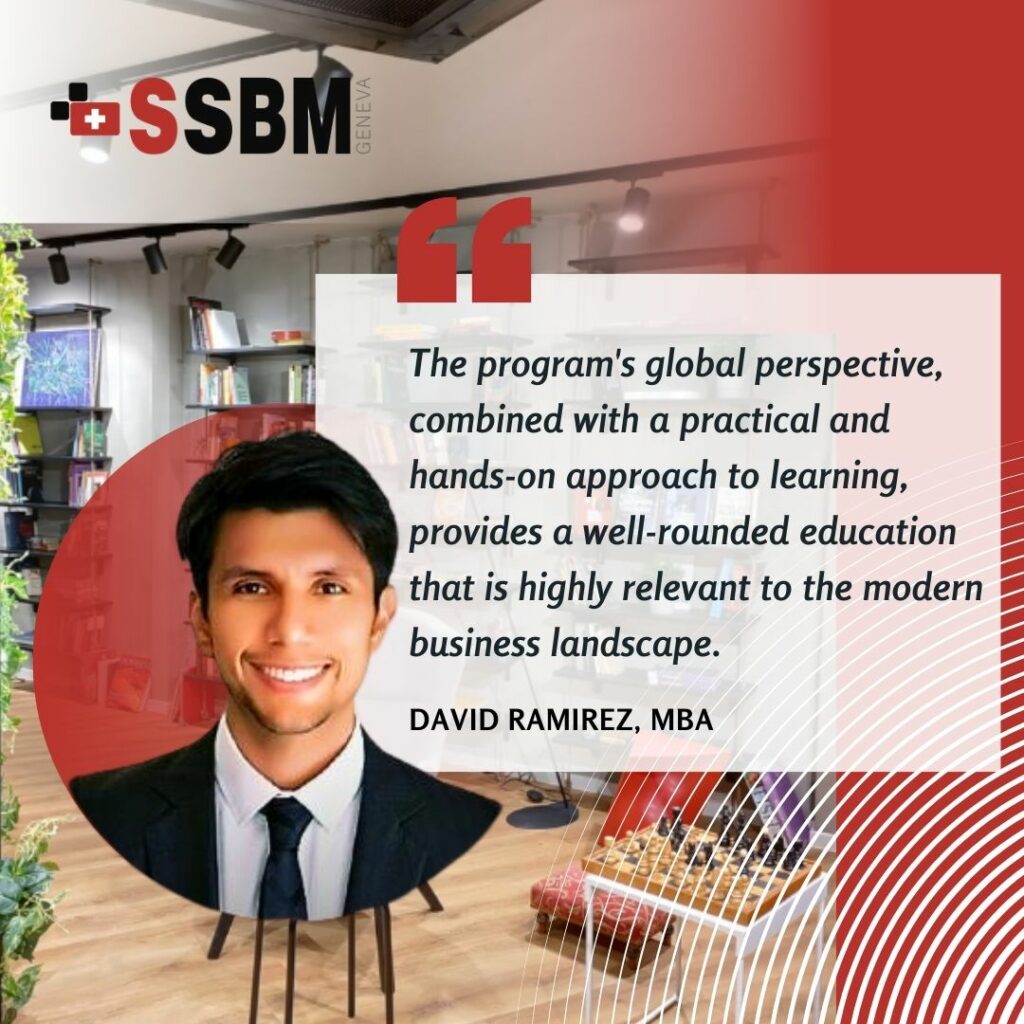Embarking on a remarkable journey through the halls of Swiss School of Business and Management, David Ramirez discovered the true power of practical education. In this blog post, we delve into David’s inspiring MBA experience, where hands-on learning paved the way for his success story.

Why did you choose to study at SSBM Geneva?
I chose to study at SSBM Geneva for several compelling reasons.
Firstly, SSBM’s reputation for delivering high-quality business education with a global perspective greatly appealed to me. The opportunity to learn from a diverse and experienced faculty, combined with its strong network of international partners, promised a well-rounded and comprehensive education. Additionally, SSBM’s emphasis on practical learning and real-world applications aligned perfectly with my career goals in space exploration and technology development.
How did SSBM’s academic program and faculty support your pursuit of a career in food and CPG industry?
The program’s curriculum and the expertise of the faculty members provided me with the knowledge, skills, and practical insights needed to excel in this dynamic and rapidly evolving field.
David Ramirez
“ The academic program at SSBM offered a well-designed blend of core business principles and specialized courses that directly related to the food and technology industry. “
Courses such as “Innovation Management” and “Digital Marketing Strategies” equipped me with a deep understanding of how technological advancements impact the food sector and how to leverage them to create innovative solutions. Additionally, modules on supply chain management and market analysis provided me with a comprehensive view of the industry’s operational aspects.
The faculty at SSBM consisted of experienced professionals with diverse backgrounds, including experts with hands-on experience in the food and technology industry. Their insights during lectures, discussions, and one-on-one interactions were invaluable in bridging the gap between theoretical concepts and real-world applications. I was able to learn about the latest trends, challenges, and opportunities in the industry directly from those who had been actively involved in it.
One notable aspect of the program was the integration of practical projects and case studies. These projects often required us to analyze real business scenarios in the food and technology sector. Working on these projects helped me develop critical thinking, problem-solving skills, and the ability to apply theoretical knowledge to practical situations. Moreover, the collaborative nature of these projects mirrored the teamwork and interdisciplinary collaboration commonly seen in the industry.
In summary, SSBM’s academic program and faculty provided me with a solid foundation and practical insights to excel in the food technology and CPG industry. The program’s curriculum, combined with the expertise of the faculty and the emphasis on practical learning, empowered me to confidently pursue and succeed in my chosen career path.
Can you highlight any instances or projects at SSBM that encouraged new skills?
Certainly, here are some examples of instances or projects at SSBM that encouraged the development of new skills relevant to the food and Consumer Packaged Goods (CPG) industry.
- New Product Innovation Challenge: One project involved creating a new product concept for the food and CPG industry. This exercise pushed me to think creatively, considering market trends, consumer preferences, and technological advancements. Developing a viable product concept required skills in market research, ideation, product development, and understanding consumer behavior.
- Brand Revitalization Case Study: Analyzing a struggling food or CPG brand and proposing strategies for its revitalization was another project. This exercise fostered skills in market analysis, brand management, and strategic planning—essential skills for repositioning products in a competitive market.
- Digital Marketing Campaign: Developing a digital marketing campaign for a food or CPG product challenged students to understand the online consumer landscape. This project required skills in digital marketing, social media strategy, data analysis, and effective communication to target and engage consumers effectively.
- Collaborative Industry Challenge: SSBM often collaborates with industry partners to provide real-world challenges. These challenges could involve addressing specific issues faced by companies in the food and CPG sector, such as optimizing distribution networks, enhancing supply chain transparency, or creating marketing strategies to target specific consumer segments.
These examples demonstrated how SSBM’s projects and assignments encouraged the development of a range of skills essential in the industry I have been involved for the last 15 years. Through these hands-on experiences, I gained practical insights and enhanced these abilities to tackle real-world challenges in this dynamic sector.
If you were to recommend SSBM to aspiring students looking to excel in their careers, what would be your key selling points or advice based on your own experiences?
I wholeheartedly recommend SSBM to aspiring students who are dedicated to excelling in their careers. The program’s global perspective, combined with a practical and hands-on approach to learning, provides a well-rounded education that is highly relevant to the modern business landscape. The faculty’s industry expertise and their commitment to student success ensure that you receive guidance tailored to your goals. Additionally, SSBM’s strong network of industry connections and alumni can open doors to valuable opportunities. My advice is to actively engage with the coursework, seek mentorship from the faculty, and leverage the resources available to maximize your SSBM experience.

